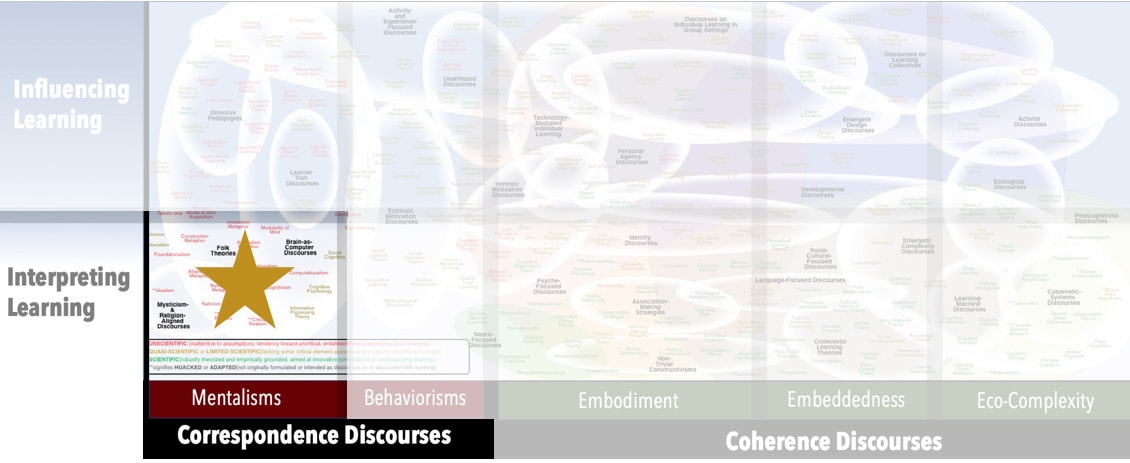Focus
Cognitive processes associated with socialityPrincipal Metaphors
With regard to assumptions and assertions about learning, Social Cognition is explicitly aligned with Cognitivism, and thus is developed around the following metaphors:- Knowledge is … information
- Knowing is … using information
- Learner is … a computer
- Learning is … inputting (and associated computer-based notions, such as processing, storing, and retrieving)
- Teaching is … transmission (of information)
Originated
1960sSynopsis
Social Cognition is a specialized Cognitivism that focuses on the learning processes associated with sociality and relationship. Subfoci include perception, judgment, and memory – insofar as they pertain to social relationships. Theories and constructs associated with Social Cognition include:- Interaction Theory (Shaun Gallagher, 2000s) – a theory focused on situated bodily actions to make sense of how one understands others. One’s embodied, interactive relations are argued to give rise to, but cannot be reduced to, mental processes.
- Intercorporeality (Maurice Merleau-Ponty, 1960s) – a precursor to Social Cognition, by which one’s identity and other knowings are understood to emerge in the co-specifying dynamics of one’s own body and that of another
- Mentalization (Reflective Functioning) (Peter Fonagy, 1990s) – the capacity to appropriately interpret one’s own and others’ intentions and emotional states
- Simulation Theory (Simulation Theory of Empathy) (Alvin Gordon, Robert Gordon, 1990s) – the perspective that one makes sense of another’s actions and intentions by imagining oneself doing whatever the other is doing
- Theory of Mind (Theory-Theory) – the ascribing of mental states to others, typically in relation to motives, emotions, and beliefs that might differ from one’s own
Commentary
The term “social cognition” is used rather widely in contemporary Psychology and Sociology, and it would appear that only a small portion of those references pertain to the theory of Social Cognition. Rather, more common usage is reflective of general agreement that the social plays a profoundly influential role in the personal (and vice versa). The actual theory of Social Cognition is much more specific and much less commonly embraced – not in the least because of its uncritical alignment with Cognitivism and its indefensible premise that the brain operates like a digital computer.Authors and/or Prominent Influences
Lacking any innovative or provocative insights, it is difficult to align Social Cognition with any seminal thinkers.Status as a Theory of Learning
Social Cognition is a theory of learning.Status as a Theory of Teaching
Social Cognition is not a theory of teaching, although some proponents assert it is useful for supporting the development of interpersonal, intragroup, and intergroup processes.Status as a Scientific Theory
With its alignment to Cognitivism, Social Cognition exposes itself to the same criticisms. For example, although it meets the scientific criterion of being explicit on how learning is understood (i.e., in information-processing terms), it fails to grapple with the extensive evidence that perception cannot be reduced to inputting, thought is something different than digital processing, and brains have very little in common with modern computers.Subdiscourses:
- Interaction Theory
- Intercorporeality
- Mentalization (Reflective Functioning)
- Simulation Theory (Simulation Theory of Empathy)
- Theory of Mind (Theory-Theory)
Map Location

Please cite this article as:
Davis, B., & Francis, K. (2023). “Social Cognition” in Discourses on Learning in Education. https://learningdiscourses.com.
⇦ Back to Map
⇦ Back to List
